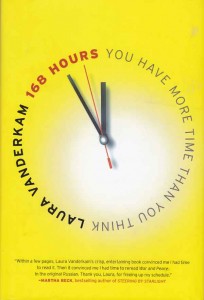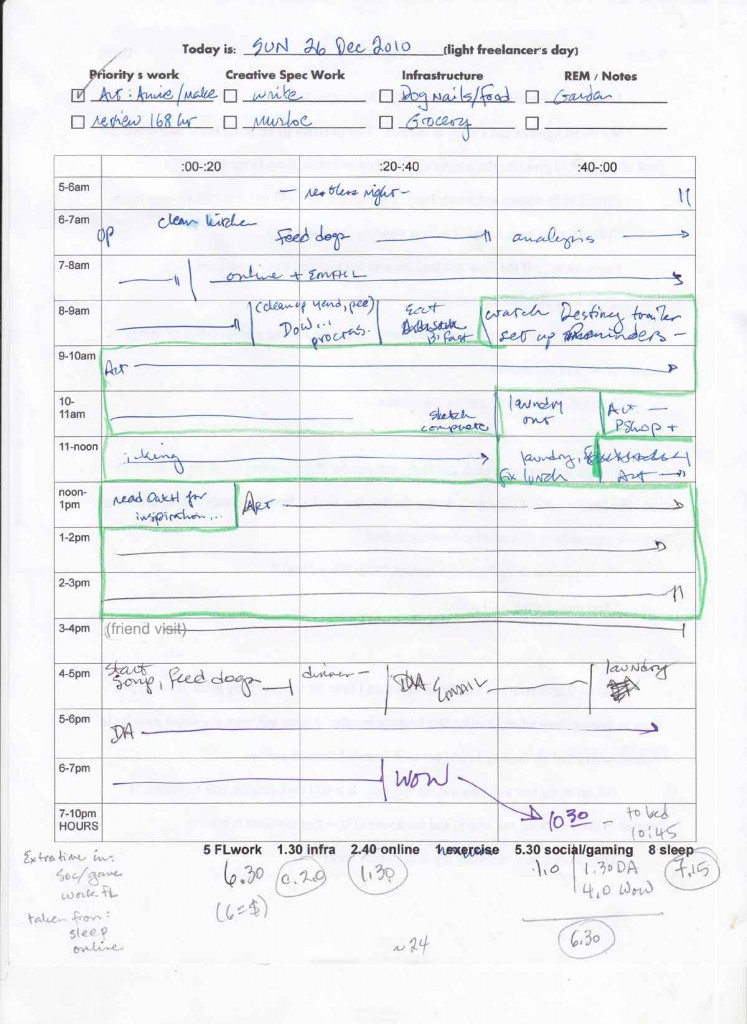Last month I wrote about “Gearing Up in the Next Expansion” and made it clear that I believe in acknowledging those whose efforts make a difference to me. I’ve already mentioned Monica Valentinelli and the magi Seth Godin, Simon Sinek and Scott Taylor. We each work with tools built by others, modifying them to suit our uses and, if we are lucky, we get to stand on the shoulders of giants.
I really cannot call Laura Vanderkam one of the giants, but her book 168 Hours: You Have More Time Than You Think deserves a tip of my hat today, and something of a recommendation.
SEEKING MY WAY
I already mentioned making some changes like returning to halftime library work. Vanderkam’s 168 Hours came to my attention when a library patron turned in the book and waxed eloquent about it. I hunted up a copy, intrigued.
 168 Hours rang my chimes; other time management books have not. It’s probably telling that Vanderkam is also a freelancing creative, another Maker determined to find balance without going broke or crazy, or both. Her ideas are widely applicable, though, not just to creative freelancers.
168 Hours rang my chimes; other time management books have not. It’s probably telling that Vanderkam is also a freelancing creative, another Maker determined to find balance without going broke or crazy, or both. Her ideas are widely applicable, though, not just to creative freelancers.
IT’S ABOUT TIME
Most time management books address your “typical 24 hour day.” This book asks you to look at, and schedule, what happens over the course of the week of 168 hours instead of just looking one day at a time. It asks you to prioritize the time spent pursuing the things you most value, using the skills you are most competent with. The rest you ignore, minimize, or outsource.
I ignore my piano. (I love it but it’s truly not a priority.) I minimize the time cleaning up dog poop, because I can still have a decent yard without rushing out every time one of my three dogs takes a dump. I outsourced grocery shopping when my first delivery was free. I’ll note that “outsourcing” my hateful grocery chore was an eye-opener. It limited the “extras” I might have picked up in the aisles. I only purchased exactly what was on my grocery list, and I got everything that was on my list. Frankly, that alone is probably worth the minor delivery charge, and I may decide to pay it in the future!
In years gone by, I used to use a “lawyer’s book” method of tracking my projects. I tried rebooting that system earlier this year, and it failed me. Inspired by Vanderkam’s book, I created a new kind of time log. Starting last November, I began tracking every minute of my 168 hours. After two weeks I could see the general shape of my days. From there, I started making choices about what I wanted to keep or change, assigning a weekly budget to each category, and breaking down that budget to a daily block of time allowed per item. I track my total alottment per day, and I keep a running weekly total to watch for growing discrepancies.
Here’s is one day’s example:

MY CATEGORIES
I track freelance time, library time, infrastructure (playing with the dogs, running errands, cooking), online time (email, surfing, and the social web), and in this example, I still had hoped to make exercise a priority. I damaged my knee badly enough to require surgery, and regular exercise came off the agenda.
Social/Gaming is a priority that has since been relabelled “leisure” to include reading and the occasional movie, although I track the subsections separately. A balanced life has both worktime and downtime, and the existence of leisure time does not equate to more time available to work. Freelancers learn this or they burn out.
My last category of Sleep is reactive, not prescriptive, after finding it an intractable average of 7.5hr/night, plus or minus 2.5 hours on any given night. I always felt sleep-deprived by my 5 hour nights, but it does average out when viewed weekly. Tracking it alerts me to the occasions I sleep badly too many nights in a row, whereupon I make it a priority to conk out early or at least plan on taking a nap.
I have full library days, half library days, full freelancer days, and Sundays are usually (as in this example) a light freelancer day. I also have a completely blank slate “weird day” when I know all bets are off: Christmas and New Years were weird days.
USING THE INFORMATION
Each Sunday I spend about an hour setting up the week to come. I build the rest of the week around the parts that cannot shift: my library schedule, a doctor or vet appointment, a conference call. I use the previous week’s results to adjust my expectations and strengthen my resolve. I zero in on problem areas.
TAKING CONTROL
For example, I keep going wildly overbudget in my Online category, spending much more time than I think I should reading articles and blogs, writing long emails, and poking around in the social web.
Because of this, I’ve installed Leechblock to limit the time I can spend on Twitter and Facebook, even though both have work-related applications for me. It forces me to be more efficient with them.
I’ve installed Macfreedom on both the PC and the Mac, disabiling my ability to get on the web at all when my focus is purely art or writing. My email can wait, really, and if I need to look up an historical factoid related to my story-in-progress, I can make a note [comebacktothislater] and just keep on writing. This works great for fiction but not if I’m writing a Library Journal blogpost, where I regularly need to check and cite sources and references.
DEFENSIVE MUCH?
E veryone who plays World of Warcraft gets hassled about how much time they spend playing it. Maybe I’ll discuss this another time, but for now I’ll say “Get off my lawn.”
veryone who plays World of Warcraft gets hassled about how much time they spend playing it. Maybe I’ll discuss this another time, but for now I’ll say “Get off my lawn.”
I use productivity software called RescueTime that measures exactly how many seconds every single web page and application is the top active window on my machines, every minute the computer is turned on. Today, as I write this, I’ve spent 5 hours 53 minutes working on this blog or the website itself. In addition, I spent 44 min 32sec with OpenOffice up (working on an edited draft), and 14min 4sec in Adobe Photoshop working with the pictures.
In the past week, I have spent 3 hours and 12min a day (average) with WoW or Dragon Age as my top window. I used to watch TV about 4-5 hours a night, from the dinnertime News Hour through Letterman’s signoff. I’ve substituted an interactive, highly social, mentally-challenging form of entertainment leisure media activity for the more socially-acceptable one that is none of those things.
So get off my lawn.
IT ALL TAKES TOO LONG
My work assignment today was for 6 hours of freelance worktime, half of which I expected to spend inking artwork. I’ve spent over 7 hours on today’s web post and honestly, I’m largely not happy with what I’ve written. I hope I’ve said something interesting or useful enough that you found it worth reading, all this long way down the page.
The fact is, this is what I’m finding more than anything else about this expedition into 168 Hour Programland. Everything takes too long. I have about 25 dedicated hours a week to give to freelance work. If you think I’m slacking off, read about the time-motion studies Vanderkam cites at the front end of her book. People who claim to work 60 and 80 hours a week — I used to claim 60 hours a week myself — they really don’t, not when you look at the kind of micromanaged time-tracking I’m trying to do here. They are productive about 45-50 hours a week, and 45 productive hours a week is what I’m shooting for.
It’s not nearly enough. There is so much more to do.
That said, it’s been a longass day with over 9 hours of logged worktime on what was supposed to be a “light freelancer’s day,” and I’m dog tired. I’m going to get myself some dinner and log into WoW.
Get off my lawn.
4 Replies to “It’s a Question of Time”
Comments are closed.